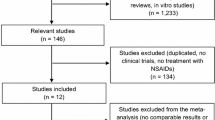Summary
There are several findings demonstrating the importance of inflammatory or immunological processes in the etiopathogenesis of Alzheimer’s disease (AD).
Several studies on nonsteroidal anti-inflammatory drugs (NSAID) give evidence for a therapeutic effect of these drugs in AD, among other the prospective double-blind placebo-controlled study on indomethacin, strongly support the therapeutic effect of these agents. Possibly also the therapeutic effects of propentofylline might be interpreted in the light of this theory.
Access this chapter
Tax calculation will be finalised at checkout
Purchases are for personal use only
Preview
Unable to display preview. Download preview PDF.
Similar content being viewed by others
References
Banati RB, Schubert P, Rothe G, Gehrmann J, Rudolphi K, Valet G, Kreutzberg GW (1994) Modulation of intracellular formation of reactive oxygen intermediates in peritoneal macrophages and microglia/brain macrophages by propentofylline. J Cereb Blood Flow Metab 14: 145–149
Bauer J, Strauss S, Schreiter Gasser U, Ganter U, Schlegel P, Witt I, Yolk B, Berger M (1991) Interleukm-6 and alpha-2-macroglobulin indicate an acute-phase state in Alzheimer’s disease cortices. FEBS Lett 285: 111–114
Breitner JC, Gau BA, Welsh KA, Plassman BL, McDonald WM, Helms MJ, Anthony JC (1994) Inverse association of anti-inflammatory treatments and Alzheimer’s disease: initial results of a co-twin control study. Neurology 44: 227–232
Breitner JC, Welsh KA, Helms MJ, Gaskell PC, Gau BA, Roses AD, Pericak Vance MA, Saunders AM (1995) Delayed onset of Alzheimer’s disease with nonsteroidal antiinflammatory and histamine H2 blocking drugs. Neurobiol Aging 16: 523–530
Breteler MM, van Duijn CM, Chandra V, Fratiglioni L, Graves AB, Heyman A, Jorm AF, Kokmen E, Kondo K, Mortimer JA, et al (1991) Medical history and the risk of Alzheimer’s disease: a collaborative re-analysis of case-control studies. EURODEM Risk Factors Research Group. Int J Epidemiol 20 [Suppl 2]: S36–42
Broe GA, Henderson AS, Creasey H, McCusker E, Korten AE, Jorm AF, Longley W, Anthony JC (1990) A case-control study of Alzheimer’s disease in Australia. Neurology 40: 1698–1707
Eikelenboom P, Hack CE, Rozemuller JM, Stam FC (1989) Complement activation in amyloid plaques in Alzheimer’s dementia. Virchows Arch B Cell Pathol Incl Mol Pathol 56: 259–262
Fiebich BL, Lieb K, Hull M, Berger M, Bauer J (1996) Effects of NSAIDs on IL-1 beta-induced IL-6 mRNA and protein synthesis in human astrocytoma cells. Neuroreport 7: 1209–1213
French LR, Schuman LM, Mortimer JA, Hutton JT, Boatman RA, Christians B (1985) A case-control study of dementia of the Alzheimer type. Am J Epidemiol 121: 414–421
Griffin WS, Stanley LC, Ling C, White L, MacLeod V, Perrot LJ, White CL, Araoz C (1989) Brain interleukin 1 and S-100 immunoreactivity are elevated in Down syndrome and Alzheimer disease. Proc Natl Acad Sci USA 86: 7611–7615
Henderson AS, Jorm AF, Korte AE, Creasey H, McCusker E, Broe GA, Longley W, Antony JC (1992) Environmental risk factors for Alzheimer’s disease: their relationship to age of onset and to familial or sporadic types. Psychol Med 22: 429–436
Huell M, Strauss S, Volk B, Berger M, Bauer J (1995) Interleukin-6 is present in early stages of plaque formation and is restricted to the brains of Alzheimer’s disease patients. Acta Neuropathol (Berl) 89: 544–551
Jenkinson ML, Bliss MR, Brain AT, Scott DL (1989) Rheumatoid arthritis and senile dementia of the Alzheimer’s type. Br J Rheumatol 28: 86–88
Koh JY, Yang LL, Cotman CW (1990) Beta-amyloid protein increases the vulnerability of cultured cortical neurons to excitotoxic damage. Brain Res 533: 315–320
Landfield PW, Eldridge JC (1989) Increased affinity of type II corticosteroid binding in aged rat hippocampus. Exp Neurol 106: 110–113
Lerea LS, McNamara JO (1993) Ionotropic glutamate receptor subtypes activate c-fos transcription by distinct calcium-requiring intracellular signaling pathways. Neuron 10: 31–41
Lewis DA, Smith RE (1983) Steroid-induced psychiatric syndromes. A report of 14 cases and a review of the literature. J Affect Disord 5: 319–332
Marcusson J, Rother M, Kittner B, Rössner M, Smith J, Babic T, Folgenovic-Smalc V, Möller HJ, Labs KH (1997) A 12-month, randomized, plazebo-controlled trial of propentofylline (HWA 285) in patients with dementia according to DSM-III-R. Dement Geriatr Cogn Dis 8: 320–328
McGeer PL, Rogers J (1992) Anti-inflammatory agents as a therapeutic approach to Alzheimer’s disease. Neurology 42: 447–449
McGeer PL, McGeer E, Rogers J, Sibley J (1990) Anti-inflammatory drugs and Alzheimer disease. Lancet 335: 1037
McRae A, Rudolphi KA, Schubert P (1994) Propentofylline depresses amyloid and Alzheimer’s CSF microglial antigens after ischaemia. Neuroreport 5: 1193–1196
Mitchell JA, Akarasereenont P, Thiemermann C, Flower RJ, Vane JR (1993) Selectivity of nonsteroidal antiinflammatory drugs as inhibitors of constitutive and inducible cyclooxygenase. Proc Natl Acad Sci USA 90: 11693–11697
Morris JC, Edland S, Clark Ce (1993 43) The consortium to establish a registry for Alzheimer’s Disease (CERAD), part IV. Rates of cognitive change in the longitudinal assessment of probable Alzheimer’s disease. Neurology 43: 2457–2465
Rich JB, Rasmusson DX, Folstein MF, Carson KA, Kawas C, Brandt J (1995) Nonsteroidal anti-inflammatory drugs in Alzheimer’s disease. Neurology 45: 51–55
Rogers J, O’Barr S (1997) Inflammatory mediators in Alzheimer’s disease. In: Wasco W, Tanzi RE (eds) Molecular mechanisms of dementia. Humana Press, Totowa New Jersey, pp 177–98
Rogers J, Luber Narod J, Styren SD, Civin WH (1988) Expression of immune system-associated antigens by cells of the human central nervous system: relationship to the pathology of Alzheimer’s disease. Neurobiol Aging 9: 339–349
Rogers J, Kirby LC, Hempelman SR, Berry DL, McGeer PL, Kaszniak AW, Zalinski J, Cofield M, Mansukhani L, Willson PL, et al (1993) Clinical trial of indomethacin in Alzheimer’s disease. Neurology 43: 1609–1611
Vane J (1994) Towards a better aspirin. Nature 367: 215–216
Author information
Authors and Affiliations
Editor information
Editors and Affiliations
Rights and permissions
Copyright information
© 1998 Springer-Verlag/Wien
About this paper
Cite this paper
Möller, HJ. (1998). Therapeutic strategies based on immunological hypotheses of Alzheimer’s disease. In: Gertz, HJ., Arendt, T. (eds) Alzheimer’s Disease — From Basic Research to Clinical Applications. Journal of Neural Transmission. Supplementa, vol 54. Springer, Vienna. https://doi.org/10.1007/978-3-7091-7508-8_17
Download citation
DOI: https://doi.org/10.1007/978-3-7091-7508-8_17
Publisher Name: Springer, Vienna
Print ISBN: 978-3-211-83112-0
Online ISBN: 978-3-7091-7508-8
eBook Packages: Springer Book Archive




